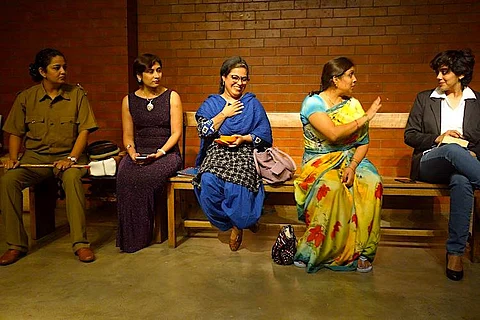

There are attempts to philosophise, comfort, joke, inspire and educate in the Pandey sisters' theatre offering ‘Ladies' Compartment’. Five disparate women find comfort in each other's life lessons and shake off burdens imposed by society on women to make space for the individual in them.
But what marks the short play, above and over the realistic script or its conclusions, are the performances of its cast. Be it the eunuch played by Imran Pasha or the vivacious tattoo-bearing cop by Pooja Pandey or the maid by Chandani Mittal, they are marvellous and seasoned in their acts.
It was the 15th staging of the play at Bengaluru's Aata Galaata during mid-July. In the small bare room with its chairs and a stage, the audience was taken by surprise when the eunuch burst in from behind the audience, chatting and patting members of the audience, before introducing the story of the play.
The metro has stopped midway due to unavoidable circumstances and left to spend their time with co-passengers in the ladies compartment are four women. After initial inhibitions and prejudices, the barriers break down and they find a common ground, that of an Indian woman playing the roles of wife, mother, cook, partner, housekeeper, et al.
If one is a corporate jet-setter, another is a maid struggling to make ends meet to educate her daughter. Yet another is a small-town girl turned socialite and another a widow, and all have a sad tale. Into this company bursts in the loud police woman Kanwaljeet who believes in living life by the moment and having fun.
A few minutes down the line, one of them breaks down after a call on the phone. Soon, the women discover they all have heartaches, however, composed and happy they seem to others. In this discovery, they take comfort and in the realisation summarised by the cop that a life without tension is no life at all. The attitude is what finally matters.
The wise maid Tara speaks of how AIDS ironically turned her uncouth, drunk husband into a well-behaved and 'strong' guy, while the south Indian Malayali, not Madrasi, laments on the dearth of sex in her life with a gay husband; the widow who spent her life focussed on cooking for her children has learnt her lesson and suspended all cooking, while the socialite Tina regrets pandering to her husband's demands at the cost of neglecting her child. The cop with her street smart ways advises the ladies to settle for lust till love turns up.
The problems tossed up are common and most in the audience can relate to one or the other. A lá desi version of Sex and the city, the women decide to take things in their hand and not languish in their joyless lives. They begin with a meeting at the widow's home for a promised treat of gaajar halwa and new beginnings.
Through all this, the eunuch walks in and out. Often pulling legs, at times pulling up or flaring up at popular, yet wrong, notions. His/her story poured out in response to an accusation of begging throws many hard-hitting questions at the audience.
The ending is a bit too pat with all social lines disappearing and a happy ending. Playwright Aarti Pandey clarifies, "Problems are acknowledged, not necessarily solved. Each will face fresh challenges like Tina's sacrifices to be with her son, or Kalyani's as a single mother. Problems will be there till life is there as told by one character."
By the way, the maid is the only one with no big personal issues besides that of money. Are the poor really a happy lot, one wonders.
Aarti points out that unlike other characters Tara the maid doesn't have the bandwidth to realise her problems. "She is in a way happy because she is doing what she can for her daughter, she has accepted her situation, unlike others."
Where the play perhaps could have worked better is if it had adapted to the place better. While Bangalore has a cosmopolitan crowd, a play provides the opportunity to coalesce the cultures. Some of the dialogues by the cop in Haryanvi were lost on me. Perhaps the maid could have spoken Kannada. The label of IIT-IIM groom would have more suited a Madrasi groom than a Mallu one. Big difference there, really.
These minor points aside, the play is a winner for the gamut of women's problems it ropes in during the 90 mins. A powerful message like 'live in the moment' may sound cliched like the title of an SRK movie, but it is a good one to reinforce.
The winners are the performers -- the cop, the eunuch and the maid. The dialect delivery was faultless, the body language realistic, and roles essayed marvellously.
Auntyji, who wears fake headphones to hear the banter around and feel a part of the crowd, Tina the trophy wife who is thrown into a hectic and loveless social life, or the corporate woman Kalyani who is set free by the cop's bold advice, are equally strong facets of a woman. But the actors do not come out as strong as the other three.
The combination however comes out as a poignant and touching tale of six humans on a brief, yet life-changing journey.